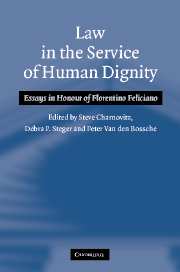Book contents
- Frontmatter
- Contents
- List of contributors
- Preface
- Biographical note
- List of abbreviations
- PART I Reflections on the contributions of Florentino Feliciano to international law
- 1 A judge's judge: Justice Florentino P. Feliciano's philosophy of the judicial function
- 2 The benign first mate
- 3 The Aristotelian
- 4 Trade and economic justice according to law
- PART II Insights into the World Trade Organization
- PART III The changing landscape of investment arbitration
- PART IV New challenges in international adjudication
- Bibliography of works by Florentino Feliciano
- Index
4 - Trade and economic justice according to law
from PART I - Reflections on the contributions of Florentino Feliciano to international law
Published online by Cambridge University Press: 29 July 2009
- Frontmatter
- Contents
- List of contributors
- Preface
- Biographical note
- List of abbreviations
- PART I Reflections on the contributions of Florentino Feliciano to international law
- 1 A judge's judge: Justice Florentino P. Feliciano's philosophy of the judicial function
- 2 The benign first mate
- 3 The Aristotelian
- 4 Trade and economic justice according to law
- PART II Insights into the World Trade Organization
- PART III The changing landscape of investment arbitration
- PART IV New challenges in international adjudication
- Bibliography of works by Florentino Feliciano
- Index
Summary
The massive increase in commitments arising from the Uruguay Round was instrumental in leading governments to realize that they needed to ensure proper fulfilment by others of the hard-earned concessions that they had negotiated, even though this meant that they themselves would be bound by the same rules. The Understanding on Rules and Procedures Governing the Settlement of Disputes, commonly referred to as ‘the Dispute Settlement Understanding’ or DSU, which forms an integral part of the Agreement Establishing the World Trade Organization and which signified a substantial change and improvement on the pre-existing GATT provisions, was intended to respond to this perceived need. One of its main innovations was the incorporation of an appeals stage in WTO dispute settlement.
The establishment of the Appellate Body represented a noticeable departure from past GATT practice, not only by bringing in a new level in dispute settlement, but also because it meant that governments accepted the existence of a mechanism that would be at the very least semi-judicial in nature, whose rulings would be definitive and which would function independently of all pressures, political or otherwise.
Conceivably, there were many who felt that dispute settlement in the WTO would go on very much as it had done previously in the GATT and that the Appellate Body would operate only sporadically, when some particularly thorny issue came up, or when a special need to have recourse to it would arise. In practice, any such expectations were not realized.
- Type
- Chapter
- Information
- Law in the Service of Human DignityEssays in Honour of Florentino Feliciano, pp. 22 - 26Publisher: Cambridge University PressPrint publication year: 2005



